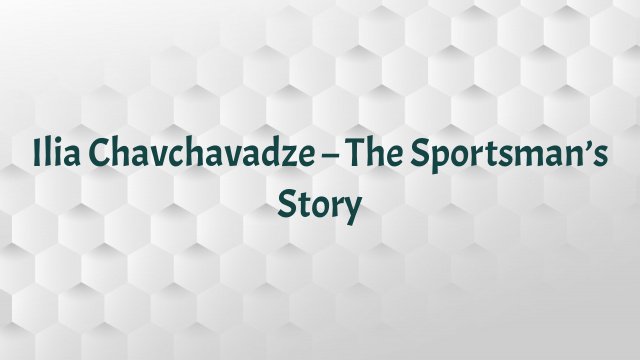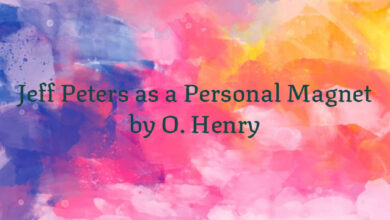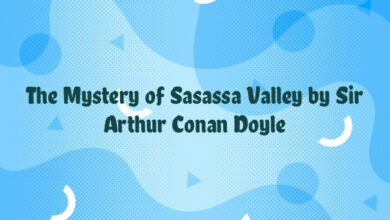
Ilia Chavchavadze – The Sportsman’s Story
What will the good backgammon player do, if he does not throw the six in time
I
I am just what is called a lover of the chase. I have a strange liking for sitting at the foot of a tree in a shady, voiceless forest waiting with bated breath for the sighted quarry. There is an untiring pleasure in this enviable occupation. I agree with you that hunting is a sin: every creature is the work of God’s hands, each has an equal desire to live on this: wide earth, but what is to be done?… Holy Writ assures us, not falsely, that it was man who shed the first innocent blood of man on earth. Man is a shedder of blood, and I am a man. Many a time have I seen a deer frightened by the hounds, many a time have I seen it and many a time has my mind been captivated by its free beauty. When it has set its branching horns along its back it runs swift, beautiful and proud, while behind it barks the trained hound. The poor beast outruns the dog and falls into the clutches of man, who in these circumstances is more merciless and less to be trusted than the dog. From afar the keen-eared sportsman hears the deer’s footfall. He hears, and his bloodthirsty heart beats and beats with sheer impatience. Now it comes within gun range, between the leaves and bushes is seen its sad, melancholy head. The dog draws near. The deer pauses, then darts round like an arrow into the bushes. Thou thinkest that since thou hast changed thy way thy beloved wood will give thee full freedom from danger, but no, J whistle. Then you should see with what sadness it stands, with what wondrous beauty it draws up its neck, how in terror and despair it begins to turn its melancholy eyes, to prick up its ears and to sniff with widened nostrils! It is so pretty and so tender and yet in its timidity there is such an attractive pride that you would think that it had gathered all the grace granted it by nature in order by its worth and beauty to soften the heart of the hidden foe! But man is not so tender-hearted as to be deterred by this, when it smelt the smell of man the deer resolved to flee, but the gun thundered forth and the deer, hitherto living, free and bold was stretched on that grass in whose lap he had first opened his eyes to greet the world and where he now finally closed them in an eternal farewell. It had been its cradle and at the end it was its grave. You should see how resignedly and quietly the proud free beast died. But its tearful eyes always seem to be asking me this question: My slayer, God’s world is large and wide — Why dost thou grudge me, innocent and peaceful, a span’s length on God’s boundless earth? These words sadden the heart until, the earth has dried up the blood spilt, and when it begins to dry. then I call to mind that even we lords of creatures, the crowns: of things created, we who are made in the image of God, do not suffer each other to have room, — when I remembered that on every foot of ground trodden by man, some of man’s blood had dried, then I consoled myself and, justified, I said to myself: “this at least is well, my friend, that thou diest there where thou wast born. We men sometimes are deprived even of that happiness”.
II
About fifteen versts down from our village there are some good hunting grounds. But why there? Everywhere in our blest land, where — as the peasants say — “Christ God has shaken out from his generous bosom”, everywhere are good places. Whatever you want is there, beginning with the graceful deer and finishing with the gentlemanly wild boar or the wise bear. Not to speak of birds. But down from our village were my favourite, hunting grounds. Well I knew their disposition and I had my game marked down and even seen. I used to go away for two or three days; when night drew nigh I turned into a little village where I had a worthy peasant gossip. I would spend the night there and in the morning when the grey dawn appeared I went down to hunt. I had not been there for two months, when at last I longed to go out. One fine, summer morning I said my prayers, took my double-barrelled gun, called my hound and went out. At the entrance to my gossip’s village where the double hedge began, on the edge of a cart road stood an old straw shed leaning against a byre. The entrance down into the stable was vaulted like the carpeted covering on a bullock cart. Round about this shed there was no trace of man. It had been, I think, abandoned to its fate and forgotten, like its owner at his removal or death. Of course, I had frequently gone up and down past this shed, for it stood on the edge of the road, but for as many times as I had passed to and fro I had not once seen a living«creature here.
Perhaps at times a skinny backed peasant’s horse which could go no farther from feebleness was enticed to the neighbourhood of the shed by the grass dried up with drought. But one day as I was passing, to my wonder, I saw a man lying at the door of the stable. That was nothing. In the morning when I went past I looked and saw the man still lying there. In the evening, before twilight had quite yielded to darkness, I came back again I found the man there. It surprized me all the more as there was none but he. I resolved that I would certainly ask my godsire who he was that evening. My godsire answered my question thus: What can I tell you, my son? No one here knows who he is. He is some needy peasant having no master; he is sick and came and settled there about a month and a half ago.
—Is he quite alone?
—How do I know? He has not any comforter there at any rate.’
—Then who provides for him?
—The world. On that road movement never ceases. There are always passers-by: it may be a man of God drops him a piece or two of bread. He asks for nothing more than that.
— He does not belong to these parts?
— What do you ask? If he belonged here how could he have so displeased God that his own folk would not have given to him. No, he is not of these parts. Have you spoken to the. man?
— Why not? I have spoken to him.
— Did he say nothing about himself?
— No. But the unhappy man was evidently educated.
— Perhaps you did not ask him about himself?
— How not ask him? Once he said to me: “I, says he, am a forgotten man, why dost thou want to know who I am? Look at me, my brother, and know me”, — says he. He spoke no more of himself and I asked no more after that. I think he is hiding himself.
This made me wonder. By nature I am a lover of knowledge and now imagine how these fragmantary words of my godsire moved my heart to learn the man’s story. What could he have to conceal? I thought to myself. I resolved that whatever might betide me, I would ask the poor man himself who he was.
One day, worn out with wandering in vain, and empty-handed, I was returning to my gossip’s. The sun was still high. It was the time when the cattle are let out of the byre. I saw the wretched man still lying in the same place. My heart could endure no more. I said: whatever may be, I will go and perhaps I shall persuade him to tell me something. I am a little tired too and it is a good way to my godsire’s house. If it does no more good it will let the rheumatism out of my wearied knees, I went up and wished him “Victory” (*1)
God grant thee length of days-he replied with a weak voice, and he came forward respectfully when he saw I was of the princely class.
* * *
“Alas! O world, (Fate) what ails thee?
Why dost thou whirl us round?
What (ill) habit afflicts thee?
All who trust in the weep ceaselessly like me.
Whence and whither earnest thou?
Where and whence uprootest thou?
But God abandons not the man forsaken by thee
(Rustaveli: “The Man in the Panther’s Skin”).
— He speaks truth who said that may thy troubles be upon me! If the world has turned to face away from me and not given me shelter, still God’s lap is broad!…
When he said this he looked up to God. You may imagine how these words from “The Man in the Panther’s Skin” astonished me from a beggar wrapped in rags!…
God bless the speech of that man whose words console even to the door of the grave such inconsolable ones! Peace be upon thy mighty soul, immortal Rustaveli.
— What shall I do? said I in my heart. This man cannot have been what he now is. My curiosity was unrestrained now that the man himself had prolonged the conversation with me and given me hope of learning something of him. I wished to question him, but did not dare: I recognized that a long familiar breath had suddenly inspired him with great melancholy. First I preferred that the cloud of melancholy should dissipate, then I would question him as to who he was. At last he turned towards me and for a long time fixed his black eyes upon me.
(*1) The usual Georgian salutation.
Ilia Chavchavadze
Works
Translated by Marjory and Oliver Wardrops
Ganatleba Publishers
Tbilisi 1987




